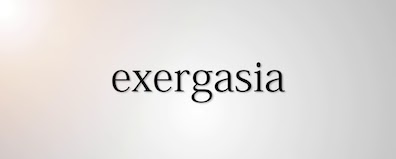Figure of speech. When Professor MacHugh asks
whether an item will appear in the evening newspaper, the
editor says the same thing in two different ways:
"— That'll be all right, Myles Crawford said more calmly.
Never you fret. Hello, Jack. That's all right." In rhetorical
theory this device is called exergasia (a Latin
synonym is expolitio), the amplification or variation
of a single thought.
Exergasia (ex-er-GAH-see-uh, from Greek ex- = out +
ergon = work) is the "working out" of an idea in new
words. John
Smith describes it as "a polishing or trimming: a figure
when we abide still in one place, and yet seem to speak divers
things, many times repeating one sentence, but with other
words, sentences, or exornations"––a definition which closely
follows one by Quintilian that Seidman cites.
Gideon Burton (rhetoric.byu.edu) offers a biblical example:
"Hear the right, o Lord, attend unto my cry, give ear unto my
prayer" (Psalm 17:1). An oration by Cicero asks, "Who is to
blame for this? Against whom shall the charge be brought? Whom
shall we accuse of having committed it?" Myles Crawford varies
"That'll be all right" with "Never you fret,"
but he might have employed many similar English expressions:
No worries, Rest easy, It'll happen, and so forth.
Exergasia has affinities with various other rhetorical
devices. It greatly resembles synonymia, but instead of
varying single words it substitutes longer expressions. It
combines easily with anaphora, as in Martin Luther
King's "I Have a Dream" speech: "Now is the time to make real
the promises of democracy; now is the time to rise from the
dark and desolate valley of segregation to the sunlit path of
racial justice; now is the time to lift our nation from the
quicksands of racial injustice to the solid rock of
brotherhood; now is the time to make justice a reality for all
God’s children." It can vary a simile, as in
Shakespeare's The Winter's Tale: "I take thy hand,
this hand / As soft as dove's down, and as white as it, / Or
Ethiopian's tooth, or the fanned snow that's bolted / By th'
northern blasts twice o'er" (4.4.362-365). In the opening
lines of sonnet 73 the playwright does the same thing with metaphor,
trying three versions of the same trope before finding one
that is neither too little nor too much: "That time of year
thou mayst in me behold / When yellow leaves, or none, or few,
do hang / Upon those boughs which shake against the cold."

